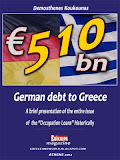by Demosthenes Koukounas
translated from "Epikaira" magazine by Pyrros
A brief presentation of the entire issue historically
510 billion
EUR in realistic calculations, is the current level of German debt to Greece,
which still remains after seventy years unpaid. This amount refers only to
payments demanded and forcibly taken from the Greek state fund by the Germans
during the Occupation. These are the so-called Occupation Loans, which have no
relationship or connection with other requirements of the country from Germany,
coming from humanities or physical disasters, war reparations and war compensations.
This issue, of course, neither is new or unknown.
However,
because there is some haze, perhaps because of the time that has elapsed and
due to suspicious reasons or expediency, it is useful to make some
clarifications to avoid any confusion. There are several sides in Greece,
usually out of ignorance, not able to understand how important it is to seek
and to recover the unpaid loans of occupation, far exceeding the external
public debt of Greece.
If in our
country there were worthy and responsible political leaders, this debt would
not have remained unpaid to date. And it's not just a question to an
overwhelming debt collected by a recalcitrant debtor. One who –until now- systematically avoided to arrange or issue
cash order. Due to the large size of this debt, it was the main condition for
the consolidation of the Greek economy over the years. In several critical
phases, if each Greek government took care to settle this German debt in any
reasonable way, we would not need to resort to borrowing in order the Greek
state to survive.
So, what
pointedly is told by competent and incompetent especially from many ignorant or
presumptuous contemporary Germans, the cause of Greek financial problem is the
non-collection of German debt. Neither sordid welter of words like "we ate
together" nor the cost of worthless politicians and voters relationship
even gaps in the Greek administrative system with so much delay revealed today.
Even any kind of unauthorized theft and kickbacks could withstand the Greek
cash economy if we had received the unpaid loans from Germany.
How did the occupying loans came up
Let us present
a very brief presentation of the entire
issue historically.
When Germany and Italy conquered Greece in the
spring of 1941, the international Hague Conventions since 1907 provided for the
part of the occupied state to pay for living expenses and maintenance of the
occupying troops. Initially, the German and the Italian conquerors imposed
arbitrary method of payment of these costs with the release of the so-called
"occupation marks" and of "Mediterranean" drachma, printed on
demand. The pertinent of Greek
occupation state reacted by in an uncontrolled way because of that currency in
which the Bank of Greece was required to commute to the official Greek note to
wearers. And finally three months later it was withdrawn completely (the occupying
brand and Mediterranean GRD) all transactions of the conquerors with their
suppliers and all other costs to Greece were made through the Bank of Greece.
In the course was
found that continual bleeds from the Greek Treasury had an unjustified and size
and were really unbearable. The corollary of this was to cover the costs of
occupation by printing new Greek banknotes resulting expands of inflation with direct primary
consequence on food shortages. In November and December 1941, precisely because
of the lack of food, especially Athens and other major cities have experienced
unprecedented hunger, with many thousands of tragic victims to languish on the
streets.
This spectacle
seems that moved some people abroad,
even in Rome or Berlin. Thus developed a series of negotiations between German
and Italian leaders but in absentia
occupying the Greek government, the power of which reached only to make certain
representations. From these negotiations, the first for the Greek financial
problem created by the occupation costs, came up the agreement of March 1942 in
Rome.
Under this
agreement, which was notified a few days later to the Tsolakoglou government, was
determined that maximum occupation costs should not exceed a total of 1.5
billion drachmas for both conquerors. This was identified by themselves
voluntarily. However, because they were asking and taking a lot more by the
Bank of Greece, much larger amounts beyond what they themselves had set as
maximum, ie 1.5 billion drachmas were classified as advances. And, indeed,
according to the aforementioned Agreement of Rome, the conquerors undertook to
return them to the Greek state.
These are,
therefore, the occupying the loans, ie the more than the agreed ceilings
withdrawals from the Bank of Greece. The two rulers agreed between them that
the money will come back "later" in the Greek state. In the next
phase was clarified that the repayment of such loans would be nil (interest
free) at the end of the war.
The terms of
the Treaty of Rome, which had retroactive effect from 1 January 1942, the then
imposed mandatory occupying government Tsolakoglou, to which were announced on
March 23, 1942, nine days after signing with a note from the German and Italian
ambassadors to Athens . The enslaved government had no choice but to accept
them.
The food issue
In the same
agreement, there was also a second part which referred to nutritional issues.
Although the conquerors, under the same international treaties that gave them
the ability to require the payment of expenses of occupation, had an obligation
to ensure the smooth reliable food of the Greek people, hitherto essentially
blame the Germans for the continued lack
of food. Until then Greeks attributed the difficulties to the problems brought
by the continued Allied blockade but it was lifted in early 1942 and in Greece
was now a point of how would be organized to be sent food from abroad with the
care of the International Red Cross.
The interest
of the conquerors to feed the Greeks was rather pretext, because if the
domestic agricultural production and livestock remained untouched by the
occupying forces, the immediate survival would be assured. But the forced
freezing or seizing of Greek food production for use of the conquerors, not
only for consumption within the Greek territory, but also for exports to
Germany, Italy and other occupied countries, Greece emptied of food.
While the
limiting of the commitments of Greek agricultural production announced
supposedly to protect the Greek population, actually began a further looting.
This time Greece was used by German and Italian occupiers ... to finance the
campaign of Rommel in North Africa. To the Greek state imposed, inter alia, the
cost of movement in the territory, military units with final destination the
eastern or North African front, the power, the shipment of vegetables, fruit
and meat on the same front, while many thousands of men conqueror who survivors
were injured or just tired of passing appropriate ... Greek tourist
destinations for recovery and relaxation! It is very typical in the case of a
new military hospital in Piraeus extraordinarily organized to accommodate more
than a thousand "wounded" coming from North Africa because they had
suffered from venereal diseases! And yet these costs were included in the
hospital "ownership costs" and charged to Greece.
At the same
time it was decided to build temporary roads, fortifications, ports and other
similar works exclusively of military nature, the cost of which again was imposed to the Greek state. These and
other similar expenses charged also against Greece and, indeed, with Hitler's
personal decision were arbitrarily
renamed from "occupation costs" to "reconstruction costs."
Let's imagine that the heavy fortifications in Crete-Marshal Gkerig apired to
make it impregnable and to transform to the new Malta-sore Greek people were
called to pay with their currency, the drachma.
The negotiations of minister Gotzamanis
All these
costs were but a wasteful management by the conquerors, especially the Germans,
in matters not envisaged by international agreements. The impact was immediate
and decisive for the Greek economy, which was dismantled, with a direct
consequence of the expansion of monetary circulation, the corresponding
burgeoning inflation and eventually extending hunger around the indigenous
population and certainly the stagnation and misery. All this without the
constant count continued humanitarian disasters. By the arbitrariness and
violence of the occupier.
To address
this growing situation then occupying government protested and caused the
opening of new negotiations, first in Berlin and then in Rome, which began in
September 1942. Greek shipping economists, technocrats and senior officials in
the then finance minister Sot. Gotzamani, took part in these debates, but
ultimately led to an impasse. Anyone who watched through the documents that
survived-and published in my recent book entitled The Greek economy during the
Occupation and the truth about the occupation loans versions-Heron, mainly from
German archives and personal archives Gotzamani, the course of these
discussions, sees the size of the Greek financial disaster at the time. The
Italian side, which mainly had the direct responsibility of the class in
mainland Greece, haunted by the fear of a global rebellion of the population,
which could not be checked. The truth is that a short trip of Mussolini in
Athens in July 1942, so personally found the size of food issue and the
economic disaster led to the understanding of the problem but not the solution.
Both the Italians and the Germans meant primarily to continue headlong economic
backwash of Greece.
From these
discussions with the representatives of the Greeks, the conquerors wanted
nothing more than to drain
any potential wealth was left the country, particularly in the agricultural production.
The solution of the food problem had been left out in the activity of the
International Red Cross.
The Final Agreement
The
discussions with the Greek delegation in Berlin, continued in Rome. There was
no benefit for the Greek people, but had to convince the Italian side, led by
German technocrats from Berlin, which settings should be followed. The real
goal was not to improve the lives of the Greeks, but how to gain more from
them.
Already in
Berlin, since early October 1942, was decided that with the Italian consent the
draining of Greece would continue. The
occupation minister Gotzamanis and the Greek technocrats returned empty handed in Athens
and the then Prime Minister Tsolakoglou refused to stay in power-he would be
replaced by Professor K. Logothetopoulos. The two rulers agreed among them
changes considered necessary upon the agreement of March 1942. Of utmost
importance was given to the full satisfaction of the requirements of the German
occupation army and the central executive options.
It was decided
that the cash payments would continue by Greece, those multiples were calculated
as costs of occupation. These amounts would be classified as advances and would
form governmental borrowing for as long as the war lasted, after expiration
would be returned to Greece without interest while the indexed base was determining.
Meanwhile any imports would be offset out from Germany and Italy. For the last
question two public companies were founded, one for a Greek-German and one for Greek-Italian foreign trade and
the Degriges and Sacig respectively.
Clodius and Reichenbach
Carl Clodius
Horst Reichenbach
At the same
time, was decided to impose control of Greek budget in order to achieve
economies of just about to be able to draw funds left. Both conquerors appoint
a special envoy who would undertake to check the exact sizes of the Greek
economy and to get at the appropriate action. These were the Noimbacher and
D'Agostino, who took more power than ambassadors Altenmprouk and Ghizi,
potential At the same time they were appointed
as financial experts, led by skilled diplomat Carl Clodius.
All they had
special powers and granted full power in the subordination Greek economy. In
today's terms would liken them to the members of the troika (IMF, ECB, EU), the
key decisions of which are taken arbitrarily and abusively. The correlations
are in some cases absolute,as the power of the Greek political authorities is
ignored, as it was then. What power and authority had then Clodius, has today Reichenbach and something similar
happens with Noimbacher and Fouchtel. With a small, unfavorable to the current
Greece difference: That sovereignty was abolished due to de facto military
defeat and occupation, and now de jure, by decision of the Greek Parliament.
The height of the occupation loan
Because at
times much has been said about the occupation loans especially for the amount
they represent, it would be very useful to make an objective-scientific, I
would say, computation, in order to know the actual amount. This task is left
to more skilled economists and is quite unfortunate that to date no one has
been found responsible of any tier to do so or a responsible politician to
appoint a committee of experts a thorough study.
As soon as the
occupation ended, the responsible institutional body, the Bank of Greece, based
on the accounts kept, identified the total payments received from the beginning
to the conquerors throughout the period of occupation. The total amount
involved in Germany is 1,617,781,093,648,819 Drs After deducting according to international
legal possession charges as agreed with their conquerors, while Germany
received as advances apart from these, 1,530,033,302,528,819 GRD and Italy
respectively GRD 157,053,637,000
These amounts are just the so called occupation loans, which
should-in agreements of March 1942 and December 1942 –have been returned by the
end of the war. This is the capital of the occupation loan the nominal value and was the
basis for calculating the debt when the payment would take place, because the
exact amount to be exported to the measure of indexed drachma. Here now the
question is what is the determining rule.
The Bank of
Greece in order to have at the time an initial assessment, used the method of
matching the price of the gold coins.It was determined that the total debt of
Germany for the occupation loans amounted to 3,670,610 sovereigns.
At first sight
this method seems reasonable, but it is not representative, because the
official price of gold pound was different from the unofficial-and of course it
was lower. Moreover, the agreement imposed by the conquerors did not prescribe
a specific method of indexation, and especially when the intended occupation
period was extremely complicated. Therefore, the search of fair valuation of
debt should follow safer calculation.
The aspect that the
calculation of the occupation loan is not correct if done with the base of the
golden pound was first argued by Professor Angelopoulos, insisting that more
rational and representative is that of the dollar. In the case -he added-, in
its assessment of the capital defined for Germany at $ 151 million by 1964. It
should be added 177 million dollars in interest from January 1, 1942, namely a total of
328 million dollars.
But if we rely
on the Agreement of March 1942, concluded between the Germans and the Italians in
Rome, the charge should not start from that date, because it is clearly stated
that the reimbursement payments are interest-free. And we can not ignore that
agreement, because on it rests the Greek claim. Otherwise, selectively ignoring
certain conditions, we risk to weaken our position and give arguments for
non-compliance.
On the other
hand, the assessment of Professor Angelopoulos is not rational, because it uses
methods that actually reduce the total debt by taking false start of the debt
to $151 million, which in April 1964 amounted to 15,100,000 pounds, or thus in
2012 to 4,530,000,000 euros. Further, according to Angelopoulos, in April 1964 the
amount with interest included, for Germany always reached 32,800,000 sovereigns,
so with the same proportions (ie interest rate of 4% and an annual compound
rate) in 2012, the total debt will wouls be 215,513,819 gold coins or euro
64.654.145.587. This is the estimate of Mr Angelopoulos for the German occupation
loans due to Greece.
However, this
calculation has two main drawbacks. As mentioned above, a) ignores the
condition of an interest-free repayment at the end of the war and b) calculates
interest rate of 4%. Perhaps in 1964, when he made his calculations, this
interest rate was normal, but when it comes to government loans it should be
2.5% and not more.
Selecting this
low interest of 2.5% and starting the compound interest from 1964, a date which
forthwith-that at the end of the war meaning when the Paris Peace Conference
took place- the German state should return the payments had been received as excess
of expenses under the occupation period, clearly under loan form and with unreserved
commitment to refund, we arrive at another amount.
But the
assessment of Professor Angelopoulos in 1964 as much as the one of the occupying minister Gotzamanis in 1952 (about 240 million U.S. dollars) are
incorrect. They both Ignore the proper valuation of the necessary indexation
base, which actually is quite complicated. We need only to recall how extreme
and sudden prices of key species were increased at the time, especially if we
take into account that real commodity prices extremely abstained from the
officials and how hard it is to be represented, to be taken as a basis
calculation. For this reason we sought a different methodology.
Our research
is oriented differently, then, with a mix of formal and actual prices on food
and household items, the real price of gold pound on the open market, taking into
account the values of the sold real estate, and other indicators,
including German debt of Greek exports to Germany during the occupation, we
ended up at a different figure. Thus, the actual valuation of the occupation debt came the day German troops
withdrew to a total of 100 billion, not including war reparations and
indemnities.
This is the
exact amount and it is certain that if once the Greek government decided to
address the issue and a special committee is appointed to investigate in depth,
then they will fully verify our estimation.
Moreover, it
should be noted that the term of short return period on loans exceeded when the quasi
loan agreement became due. This happened when the Peace Conference of 1946took
place and since the loans are interest bearingso that the initial capital of
EUR 100 billion to date, with a low interest rate of 2.5% reaches 510,033,165,000 euros.
Therefore,
this amount should have been paid by the postwar German state but it neglected
to do so. Under the guise of dismemberment, they invented a series of arguments
to avoid repaying the occupying loans with the tolerance or complicity of the allied
governments. Several years after the Peace Conference invented the argument
that Germany was unable to sign the Final Peace Treaty while they were
dismembered. If it was a bona fide debtor West Germany, over the intervening 44
years to unify could have paid its fair share of attributable albeit gradually.
But refrained to do so, such as avoided in subsequent years, later it was
consolidated and could not rely on similar allegations.
What happened to the Loans
The so-called
occupation loans, which within the absurdity of the conquerors had claimed from
a country of constraint capabilities
such as Greece and managed to break so fundamentally Greek economy, the
Greek governments have failed so far to collect. Ooccasionally they made some similar action but without results.
Already in the
Peace Conference in Paris in 1946, the then Greek government tried to save the
topic, along with war reparations and indemnities. Germany was then an assembled
state and, were dismembered into separate occupation zones, so the requirement
that Greece was not possible to set. Instead, in what concerns in Italy, the
issue was raised and after various fluctuations and Greek state was satisfied
in this chapter later.
The fate of
the Greek claim to Germany should typically be set to satisfy when the Treaty
of Peace was signed, something impossible as long as the country was divided
into East and West. However, after the establishment of the Federal Republic of
Germany, gradually began to develop bilateral economic relations with Greece,
but the German leaders did not consent to the arrangement of debt on the
grounds that they were not obliged to do so. At various periods, the Greek
government raised the issue without being able to change the German attitude.
In November
1952 he returned to Greece after he managed to obtain amnesty, S. Gotzamanis
the finance minister during the occuoation, ending years of outlawry abroad.
Upon arriving in Athens, came to argue that the Greek government should not
abandon its occupation loans and ought to ask for repayment.
At the time,
the Greek Alert, party of Marshal
Papagos, was in power did not formally requested the repayment of the occupation loans since the London
Conference in 1951 had declared that the signing of the Peace Treaty was prerequisite.
Nevertheless,
the request was repeated on several occasions and the renewal of a negative
response from West Germany leveled with another financial facilitation. The
issue came up again openly in early 1964, when in power was the government of the Union of the Centre.
Followed three new “knocks” to the German Federal Government by Angelo
Angelopoulos, Andreas Papandreou and Evangelos Savvopoulos respectively,
without positive result.
In recent
years, the publicity of the occupation loan from Germany claiming, comes up
every now and then especially after our country was at the epicenter of the
financial crisis with all its attendant. In particular, the attitude of modern
Germany is causing stronger Claiming.
However, this
kind of Greek requirement is not subject to limitation as some at the german
side support to avoid the payment, because the mere fact that at times the
theme is reset by the Greek side, even though for general reasons have not
resorted to judicial proceedings, excludes the limitation.
Something
more, we would add: It's a matter of honor for modern Germany, the leadership
of which is presented haughty towards Greece because it was found in
economically weak position to repay the actual debt towards her. And it's so
real, literally soaked in blood, so today's leaders become reprehensible when
the index finger aimed at Greeks so poignantly and clearly unethical. Hopefully
this story, rather than stand with dignity and objectivity in the study of the
historical object, we had to pay more attention to the emergence of smallness
scored by the Germans during the occupation.
The fact that
the postwar Greece-rather than emotional reasons because of the general
sympathy for contemporary Germany or even on grounds of inability of its own
respective governments, did not persistently claim the repayment of the occupation
loans- does not mean that they cease to be a debt of honor for a country
claiming a hegemonic position in the European Union.
Lately, occupation
loans. are becoming a popular subject, although they often are confused,
usually out of ignorance, with the issues of war reparations or compensations.
The chapter of the occupation loans is perfectly clear and after the war has
not been made the slightest payment by Germany. Instead-and this may be the biggest
proof of the validity of the Greek claim;, the other borrower of occupation loans, Italy, since many years has repaid its
debt.
Eminent
foreign economists have only recently confirmed the German debt. The German
Professor Albrecht Ritschl has assured the undeniable existence of the German
debt, while the Frenchman Jacques Depla has spoken of a height of 575 billion
euros.















.jpg)
















































